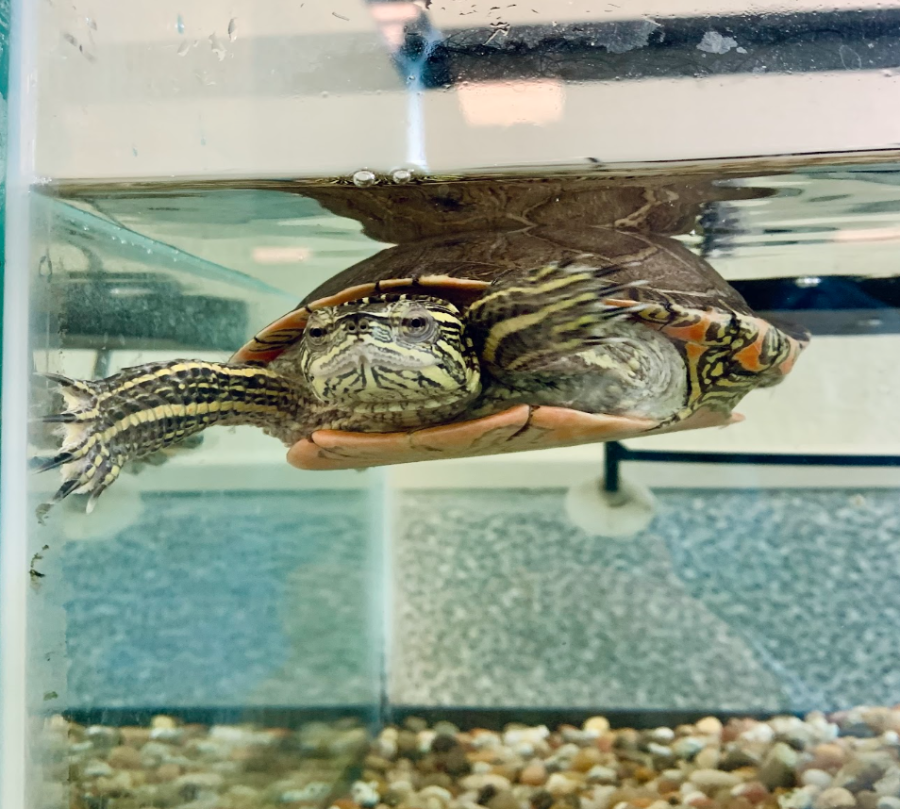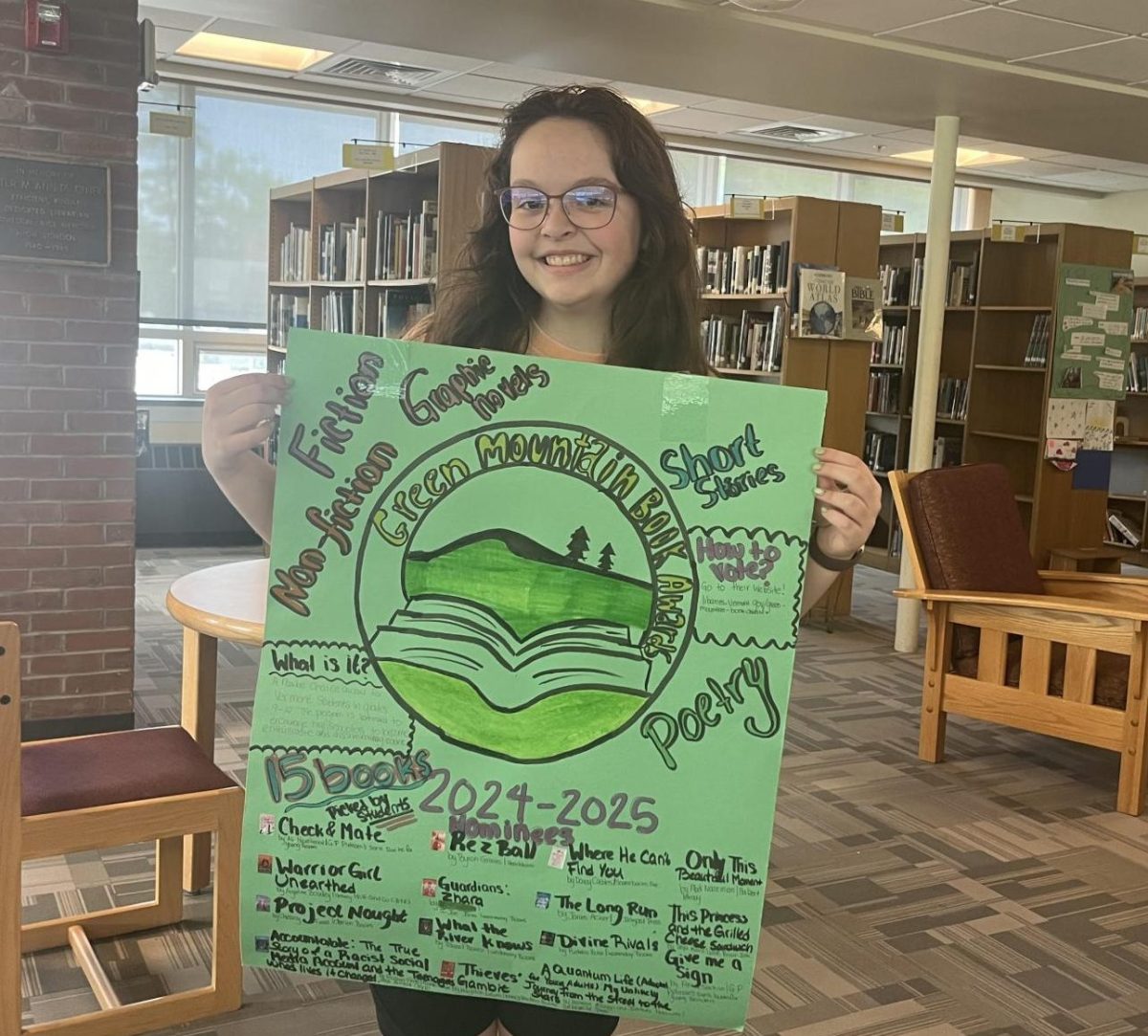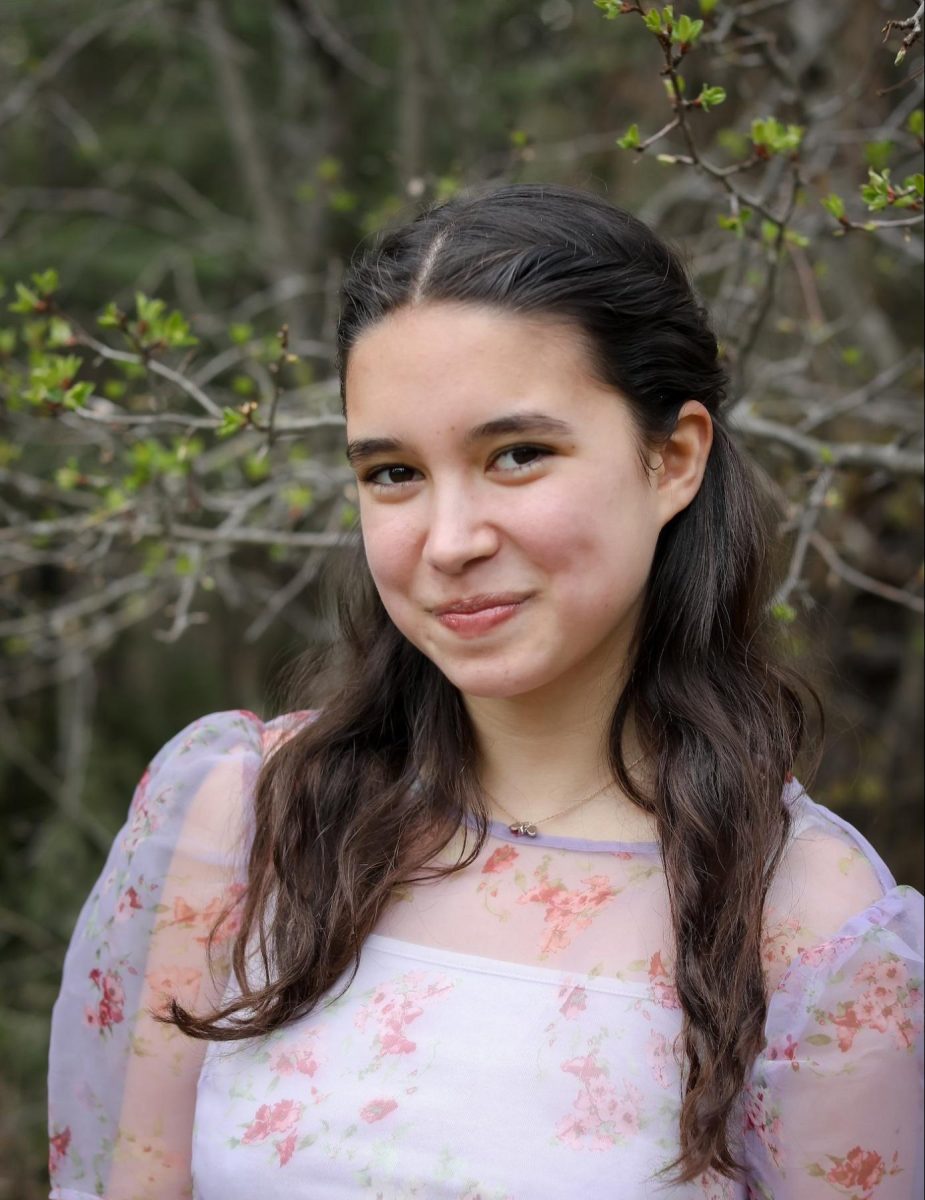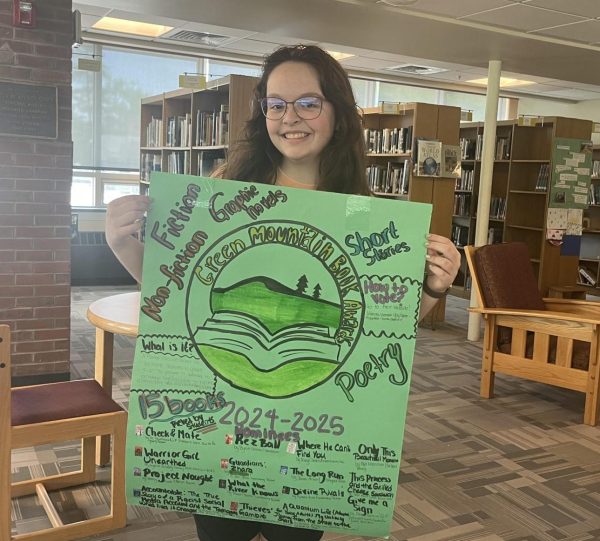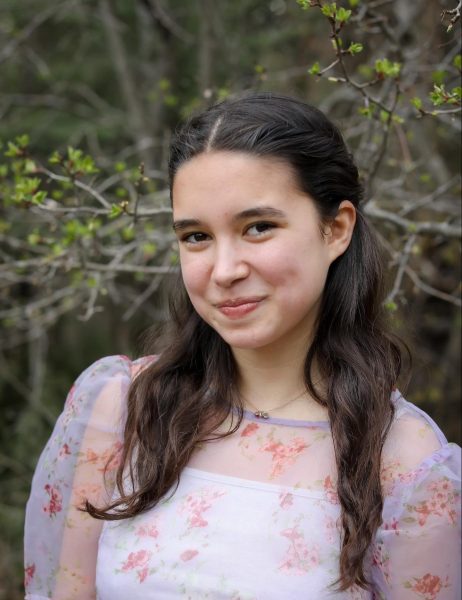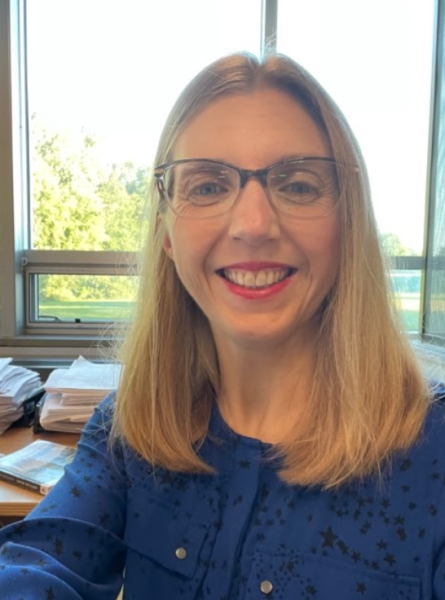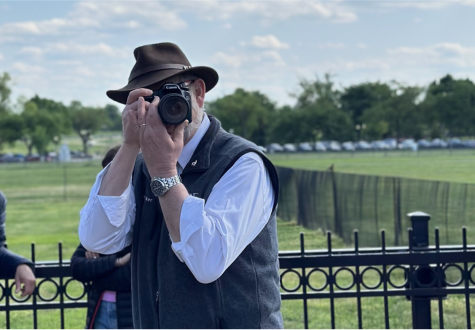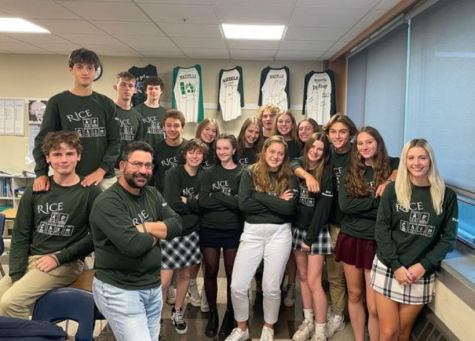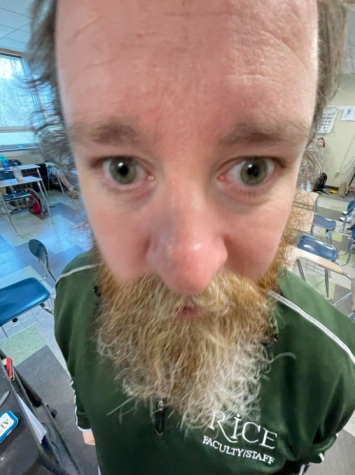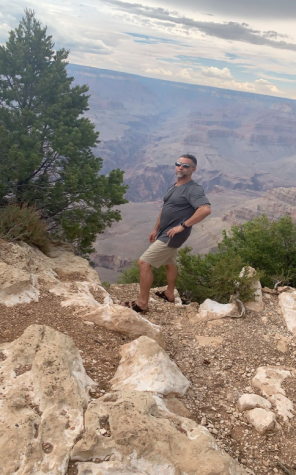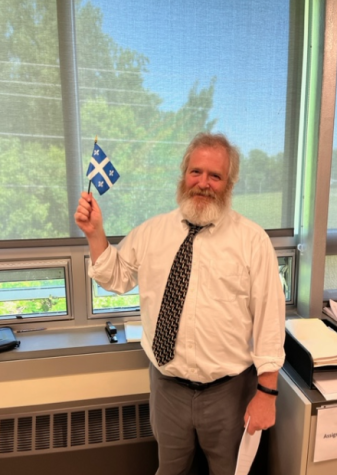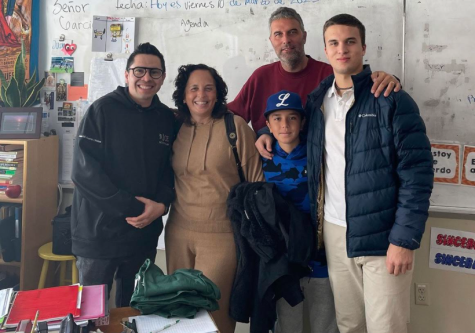It Resembles A Puzzle: Nurturing Minds and Embracing Nature
Waiting patiently to be fed is Minion, the turtle in Sharon Boardmans tank that is located in the back of her classroom as the class pet, on May 25, 2023. (Photo/Rachel Fernandez)
June 5, 2023
Amidst the ever-changing landscape of education, since she started teaching in 1989, Sharon Boardman’s unwavering dedication to teaching and love of science have captured the hearts and minds of many students that she has had over the years. She has been teaching at Rice Memorial High School for 31 years now, as one of the school’s science teachers. Teaching students about chemistry, biology, anatomy, and other fascinating science classes.
She always seems to be seeking opportunities to immerse herself in the outdoors and embark on exciting adventures. Her vibrant spirit and boundless curiosity guides her to constantly seek out new and exciting experiences in nature. Illustrating this through her love of golfing, skiing, fishing, kayaking, and many other activities that she undertakes.
She also has an immense love for puzzles, and she incorporates this love into her teaching. For her, science is like a captivating puzzle, where each scientific discovery brings students closer to assembling the complete picture.
Q: What are some of your favorite hobbies? Why are they so enjoyable for you?
A: I’m a really active person. But, I would say I’m not particularly an athlete. I ride my bike and do bike trails. I’ve always hiked. I just picked up golf in the last five years. I’ve become just sort of over-the-top fanatical about anything that you can do outdoors. I used to fish a lot and I think golf as fishing with walking included because when you fish you’re pretty much just stuck in one place. But, golf is kind of the same thing. You still got something in your hand and instead you’re trying to solve a puzzle. Sort of like playing pool in three dimensions. So I like that kind of activity. I also kayak and ski in the winter too, all the time. Used to rock climbing. Don’t do that as much anymore.
Q: Before becoming a teacher, what did you do?
A: I worked in Yellowstone for about 12 years. That was a big chunk of my life. I had lots of different jobs there. I was in charge of employee housing and employee recreation when I worked in the park service for the young adult Conservation Corps. Then I switched over to concessions, and I did almost every job that you could do in a hotel. I was an Employee Services Manager. So I was in charge of employee housing, but then in the offseason, like the winter, I would work as a hostess or something at the restaurant at Snow Lodge located in Old Faithful. So all those different types of jobs. I worked in the personnel office, I was location manager at Old Faithful Inn and so I was in charge of the whole place. I had hundreds of employees, so I learned a lot about management, about motivating people, and a lot about how to be a good time manager for myself because I had tremendous responsibilities. And then I was just like, why am I doing this? When I was working in tourism I mostly had to deal with unhappy guests, they’d be like, “There’s a hail storm out there and my car is being blown by hail.” And I’d be like, what did we do like me to do about it? I can’t control the weather but they’d be angry and you just have people yelling at you all day about stuff that you had no control over. And I just decided to do something about it. But [before that] when I was in college, I worked in a greenhouse. And I actually worked in a greenhouse here [in Vermont] when I first moved, so I always liked keeping my toes wet in biology. And even when I worked in Yellowstone people would be like, “Oh, what’s that?” And I’m like, oh, that’s Arctostaphylos uva-ursi. That’s Kinnikinnick used by the Indians as a tobacco. I knew all this stuff about nature because I had studied that in college and so I just felt like I was being called back into biology somehow. And that’s why I’m here today.
Q: Why did you want to become a teacher? Is there a specific insistence that you knew being a teacher was what you wanted to do?
A: I actually didn’t think I wanted to be a teacher. I’m still surprised I am one because when I was growing up all my friends wanted to be teachers and I never wanted to be. I always wanted to be a student. So [as a child] when we would play I would always play with the students. And then when I did my education program at the University of Montana, the first class you take is Observation and I had to go to an eighth-grade physical science class and a sophomore chemistry class. I observed these teachers for a whole semester and I was just blown away. It looks like such a fun job. And I had already been out in the world. I think I was probably 28 before I went back to school to become a teacher. I was just really impressed. So that’s when I knew after watching these teachers teach, I knew I wanted to become a teacher.
Q: What is your favorite part about teaching?
A: Definitely the kids. I love kids and I am always surprised by kids. I love my discipline too. I think that it really helps for teaching high school. I could never really be an elementary teacher because I don’t think I can teach the alphabet or something. I’m pretty passionate about science, I always have been. I also like puzzles. So a lot of people know that about me and I sort of tried to make it apparent to people who also love puzzles that science is really just a puzzle. We have to find the answers through the logic of the universe basically.
Q: What inspired you to become a science teacher?
A: I’ve always liked science, I’ve always liked problem solving, and I’ve always liked math. So it was a really natural fit. When I went to college I knew I was either going to major in math or science. I had a hard time narrowing it down because I was just interested in everything. But, I finally chose biology because I could see a path forward for myself. I didn’t take engineering classes or anything like that, but I probably would have been just as happy to be an engineer. It’s just that I ended up as a biologist because that was what I was most interested in, especially living in Montana, and being absorbed in the outdoors all the time. I had a lot of friends that were forestry majors and wildlife biology majors. So I’d go out in the field with them, and watch spiders build their webs and stuff. It was just so cool and interesting.
Q: How do you feel your personal interests connect to what you teach?
A: I think there’s a huge connection in biology and I mean anatomy of course. It’s been really fun. This the first year we’ve ever gotten through the entire curriculum [of anatomy], like I had never done the integumentary system before. I think I’ve only done the reproductive system once so it’s really fun to just see the whole human body in just a year like a snapshot. So I’ve enjoyed teaching anatomy. I’m glad to get to teach it again next year. Because sometimes I’ve taught it and then I don’t teach it for a few years and then I get it back, and I don’t like the old curriculum and I keep changing it. But I’ll have it perfect by the time I retire. Biology I’ve always just enjoyed. I mean it’s so interesting. I don’t really love AP Biology. I don’t love the way the College Board wants it taught. I think it would be a much more effective course if there was just a little less content. You could go into more depth and just breath. But I still like it and I think I do a good job. I’ve made sure that I have all the background. I’ve gone to all the training, I stay up to date on all of the training every time they’ve changed the course. Which has been about three times since I’ve been teaching it. They keep updating the course. Now I’ve been grading for the last few years on the exams, so that’s really helped me become a better AP teacher. I also teach chemistry and always loved teaching chemistry. Chemistry is maybe my favorite class to teach, because it’s all about problem solving. Even kids that say, “Oh, I can’t do this.” Or, “I don’t understand that.” I just work with them individually until they start to make the connections. And I make it very math-heavy. So it’s like an extra math class which I think kids need the reinforcement for chemistry.
Q: How do you bring your love of the environment and the outdoors into the classroom?
A: I do have anecdotes about my life of things I’ve done like building, sleeping in snow caves, and other stuff like that. I don’t know if I’ve talked about them. Talking about bears. I have lots of stories. AP Biology doesn’t really have time to talk about stories, but I’ve had experiences, I’ve had a lot of life and death experiences outdoors. So, I try to use those cautionary tales. I mean, I think nature needs to be respected. But also if you love being out there you have to know your limitations. And you’re always testing your limits when you’re outside. To see what you can do. Like I’ve gone on long kayaking trips in Alaska, and I could have gotten killed by a bear or drowned or something could happen. It’s amazing that I even did those things. It was way before cell phones and you’re just out there sometimes even by myself. I liked what Mr. Welsh said today about how when you’re outdoors you get into your spiritual side and I definitely feel when I’m outdoors so it’s all connected to what I teach because I think the teacher brings her personality into the classroom and so you can’t help but make those connections.
Q: What clubs or activities have you been involved in at Rice? Why are you a part of them? Are they connected to science?
A: I would say Neuroscience Club. I think it’s been around for 12 years and I’ve done it for 11 years. So we didn’t do it the first year, but I’ve done it every year since then. And there were some students who wanted to do it and sometimes there were only one or two students who were the Neuroscience Club. When we did them, we’d always go through the book that comes with the [Vermont] Brain Bee. We would go through the Brain Bee book and try to get kids ready to compete in Brain Bee and we’ve always taken kids to Brain Bee every year that we’ve done the Neuroscience Club, so that’s really the goal of that activity. But for 20 years before I did Neuroscience Club, I did the Outing Club, which was a huge club at Rice. We would have 70 kids that would go to Stowe on Friday nights when Stowe still had lights. They got rid of lights so we would go to Bolton. We take kids skiing, and downhill skiing. We also do cross-country skiing, kayaking, horseback riding, and indoor and outdoor rock climbing. We did bike riding as Mr. Welsh does now. Also taking kids hiking. That’s pretty much it. We’ve done river trips and lake trips. Just all different types of activities. We try to have at least a couple of activities a month. And of course during ski season that’s every week, so consecutive weeks. Looking back on it it’s like I can’t believe I ever had time to do that because like nowadays, it’s hard for me to even find time to go golfing after school but I always found time to do that. When we hit the club, and it was big, like some years we’d have like two buses that would go on these trips. So, it takes anywhere from 40 to 70 kids skiing and other trips like that. We did like horseback riding and things like that were usually smaller but I always roped in other teachers, there were a lot of younger teachers back then. I was younger too. So it was easy to find people to do stuff like that. But there was a really big thing and a lot of kids who were in Outing Club are still friends of mine on Facebook, and Instagram, who send me pictures of kids and stuff. I think it’s important to connect with kids outside of the classroom. Either by going to sports or by bringing kids places. I took kids to Costa Rica a couple of years ago with AP Biology. So I think that’s just really fun and rewarding.
Q: What is your favorite science class to teach?
A: Chemistry, definitely. I love teaching chemistry. I teach the lowest level of chemistry. Mr. Mazzella teaches honors Chem and AP Chem, so I get the kids who are not in love with chemistry. And I don’t try to get them to fall in love with chemistry, but a couple of them do. I have a couple of kids this year and I had two last year that went on to AP Chemistry this year, after taking just gen chem last year. I consider that a success. What I love about chemistry is that a lot of the kids that are here are afraid of math and just solving problems. And so I tried to make it really methodical. We do a concept, and then we do the practice. It’s very predictable, which is great for the kids, I think because those kids are not having it mixed up every day. They know exactly what we’re going to be doing every day of the week. Like we have our worksheet Fridays, and we always do labs on lab days just like I tried to do with AP. I think all the science teachers tried to do labs on lab days, which is not what I understand the rest of the building is doing, some teachers actually lecture on lab days. I can’t imagine doing that, but I had to do it in AP Biology this year, otherwise, we wouldn’t have finished. But, I couldn’t imagine doing that all year. Just having a double block class instead of activities. So I think that is what makes teaching science enjoyable is doing the activities. It’s where you get to see kids doing stuff and you get to know them personally and see what they’re interested in. This year we did this bubble lab where kids put their hands through a bubble. I was so interested in it. But I didn’t think kids would really like it. But the kids really liked it, and I just always get excited [about labs]. I always mix up the labs so that it’s not redundant and so I’m not doing the same thing all the time. But, I do love teaching chemistry because I see the progression from the beginning of the year. Those kids come a long way. Usually AP Biology and even anatomy, it’s upperclassmen. Most of them already are good students, and then they are still good students at the end. But in chemistry, you get these kids that are reluctant learners and they’re all confident by the end of the year. They can do chemistry. It’s so much fun.
Q: What is the most rewarding thing about teaching something you love to young students?
A: I do like the personal connections. I can’t imagine being retired and not seeing people all day. I think I’m going to be working because you’re always interacting with people. I’d say that’s the most rewarding part, just getting to know people. Not just kids but colleagues, staff and everybody here is all working together towards a common goal. And your senior class has just been fantastic. It’s one of the best classes ever. Just a really good group of kids and even though there’s been drama, it seems to have just made you guys stronger and closer. Maybe you don’t feel that personally, but for a lot of the kids that are here there’s been some drama and everybody’s come out okay. Nobody ended up in worse circumstances. So hopefully that continues. Kids are pretty resilient. It’s just been fun to see this group COVID kids grow.
Q: How does your love of the environment and outdoors help you as a teacher?
A: I can always make connections. It’s helpful if kids like the environment. Sometimes kids don’t, because some kids don’t like bugs or they don’t want to touch anything. I hopefully make them feel a little more at home, in the outdoors. Plus my room. I have a lot of plants and stuff. Sometimes kids will just walk in and say, “Oh I miss this room.” if I don’t have them in another year. I have a lot of kids this year especially who come and eat lunch in my room and they just go sit by the plants and actually think that that’s important to them, it’s kind of important to me. I like having plants. It makes it feel outdoorsy.
Q: If you could compare teaching with something else in your life, what would it be?
A: Parenting! Yeah, definitely. Because you have to keep a steady demeanor. Sometimes people lose it, but try not to lose it. I also think you have to keep a steady message. I always felt that with my children even though I might find their misbehavior interesting or even appalling, I’d always just try to keep a steady message of I still love you, and still know you’re gonna be okay. I think having that sort of steady message is really important. That’s the biggest connection I would see between teaching and parenting. You’re dealing with kids that are still in development. They shouldn’t act like adults because they’re not adults. And even with my kids, that’s why I’m getting emotional because my son is 29 and he still acts like he is 16. We keep a steady message and have his back. And I think that’s really important for a teacher too. And like Mr. Welsh said, “Just see every kid is an individual and the good in the kid, even if you know stuff outside of school, or you hear stuff. You just have to look at the good side.” Sometimes it’s the person you least expect. There are some times you feel close to a kid and they’re across the hall with Mr. Cook. And you think, but I can help you with that. But, I think every kid sort of finds the teachers that they sort of understand, and some kids just don’t ever connect with teachers. But, there are always a few. I’ve had the same group of kids eat lunch with me for the last three years, and it’s just touching.

